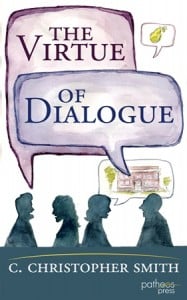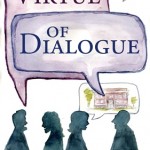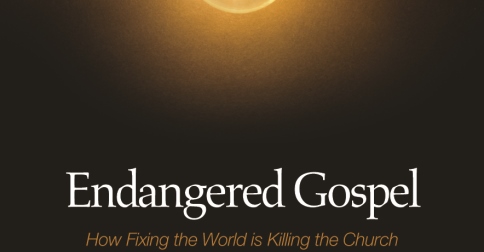 My ebook The Virtue of Dialogue: Conversation as a Hopeful Practice of Church Communities was released last week by Patheos Press, and in it, I argue that open conversation is essential for the health and flourishing of church communities and the places they inhabit.
My ebook The Virtue of Dialogue: Conversation as a Hopeful Practice of Church Communities was released last week by Patheos Press, and in it, I argue that open conversation is essential for the health and flourishing of church communities and the places they inhabit.
Over the next two weeks, I will be running a 10-part series that I am calling “Becoming Conversational” in which I offer suggestions for how churches might enrich the conversational life of their church communities. (Some of these ideas have been adapted from my earlier ebook, Growing Deeper in Our Church Communities, which is available for free download here. )
In the spirit of conversation, I encourage readers to utilize the comments section below to ask questions, share relevant stories from their own experience, etc.
#2) Leveraging the Skills of All Our Members.
God has provided us with the gifts and skills of all our members to be used to bear witness to the Kingdom of God. The problem is that we have an extraordinarily limited imagination about what the church could be — thinking of it primarily as a religious community –and we all too often try to jam our members’ skills into a relatively narrow set of “spiritual gifts” — pastor, teacher, musician, usher, children or youth worker.
There are two key conversations here: 1) finding out what the gifts, skills and passions of our members are, and the more challenging conversation, 2) figuring out how to orchestrate these gifts creatively to the greatest extent possible in way that bear’s witness in our neighborhood to God’s ongoing work of reconciling all creation.
Here’s one example, of people who have the skill of fixing things. Have them share their knowledge (perhaps in a neighborhood seminar), especially for easy-to-fix things like mending clothes or changing a car’s oil. For more complicated fixes, find ways to spread word throughout your congregation of their skills and willingness to fix things for free, for barter or for a modest and fair fee.
It is especially important that we get to know the gifts of those people in our congregation who might be marginalized in society at large, children, youth, seniors. I’ll discuss children and youth in tomorrow’s post in this series. Your congregation probably has older people who are skilled at fixing broken things, helping neighbors in need, helping with childcare or schooling, etc. At Englewood Christian Church, we have a group of retired men who come to the church building every weekday morning and do whatever work needs to be done – whether that is taking people who cannot drive to doctor’s appointments, painting or doing fix-it type jobs.
Our primary work as the church is to love and care for one another and for our neighbors — not just in words, but in real, everyday ways. God has given us the skills of all our members to carry out this work. Our task as individuals is to submit our skills and as the church to identify, leverage and organize these skills in ways that bear witness to the reconciling work of God. Our experience here at Englewood is that doing so will plunge us into a deep pool of conversation.
Tomorrow: #3 Engaging our children and youth in conversation.
Yesterday: #1 Open Existing Meetings for Conversation












